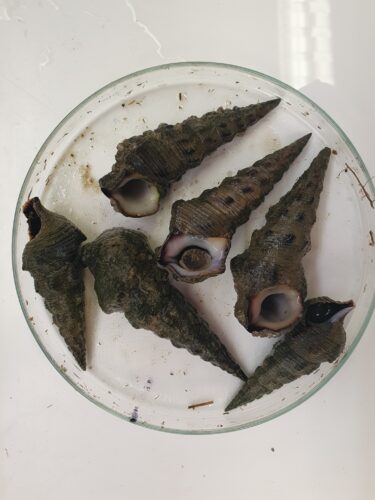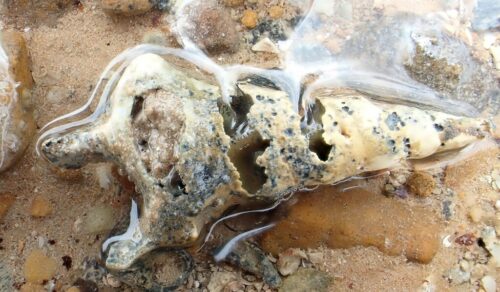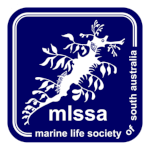PhD student Brad Martin has made some exciting research findings. Brad, with Ryan Baring, was seeking to understand how the different bivalve habitats within the Port River estuary are supporting different species of fish.
The different bivalve habitats include Ostrea angasi (southern flat or mud oyster or angasi oyster) restoration sites in the Inner Harbour, razorfish (Pinna bicolor) beds of the Outer Harbor, and Pacific oyster, Magallana gigas patches on Torrens Island.
Brad reports that Hercules Club Mud Whelks (Pyrazus ebeninus) have turned up along Torrens Island, which represents the first time that these have occurred in SA for possibly thousands of years.
Details of Hercules Club Mud Whelk (Pyrazus ebeninus) can be found·on iNaturalist.
He reports that he has found >100 species of invertebrates and fish associated within the Pacific oysters patches, through a combination of extractive quadrats (taking Pacific oyster samples), as well as nets and cameras.
“Following my conversation with Peter Hunt, the main identifying feature of the Hercules club whelk is simply its large size as adults, as it can be difficult to ID between different species of juvenile mud creepers,” Brad says.
“We also didn’t have a clear answer regarding the presence of the Hercules Club Whelks in the SA fossil records, while they do appear as (far) south as Tasmania (link) the only fossil indication of their presence in SA is this iNaturalist post (at) (https://www.inaturalist.org/observations/137461067) .
In any case, (it is) a really interesting species to have turned up in the Port River!”

Hercules Club Mud Whelk, Pyrazus ebeninus
(Taken by Brad Martin)
(Source: https://www.inaturalist.org/observations/154525851 )
Brad has posted his sighting on iNaturalist. His sighting is comparable to sightings of the Australian Mud Whelk, Batillaria australis, also reported on iNaturalist.
There are many photos of Hercules Club Mud Whelk (Pyrazus ebeninus) on iNaturalist. The sighting recorded at https://www.inaturalist.org/observations/137461067 has been posted by Mike Burrell.

Hercules Club Mud Whelk, Pyrazus ebeninus
(Taken by Mike Burrell)
(Source: https://www.inaturalist.org/observations/137461067 )
Mike found the specimen at Weeroona Island, SA on 28th September 2022. Mike found it there on inter-tidal rocky reef (derived from the St Kilda Formation north of the boat ramp) at low tide.
There have been numerous responses to Brad’s posting of his sighting. They confirm the identification of the species as the Hercules Club Mud Whelk, Pyrazus ebeninus.
Comments added to the posting include: –
“Wow, this is a first! Pyrazus ebeninus is extinct in South Australia, and has been for many thousands of years. This represents the first record of confirmed recent specimens, to my knowledge.”
“So far, three species have re-appeared in SA (Port Adelaide) after recent extinctions; P. ebeninus, Batillaria australis, and Anadara trapezia – according to iNat observations.”
“I’m not sure yet whether these are natural establishments supported by warming waters, or ballast water-facilitated introductions. I’d lean toward the latter.”
“That is astonishing. I’ve never heard of this species before and will take note of it, and of the relatives. Wondering if any in that group will turn up in other harbours in SA.”
“I have passed this observation onto Marine Invertebrates Department, South Australian Museum.”


Interesting indeed. Cynical me thinks-without knowing- they are yet another result of ballast water discharge decades ago before the more effective international maritime rules were introduced regarding ballast water management.